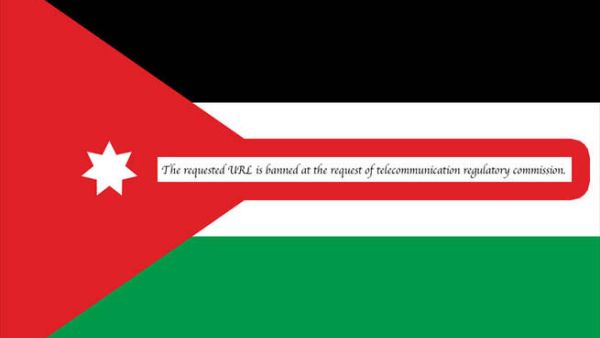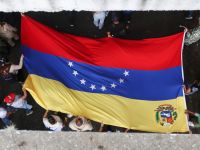The Jordanian media was plunged into chaos on Sunday afternoon, as the Press and Publications Department (PPD) held a seemingly impromptu crackdown on unlicensed websites operating in the Kingdom.
In an exemplary feat of bureaucracy and delegation, the PPD published a list of over 280 unlicensed news sites in Jordan, and gave the list to the Telecommunication Regulatory Commission (TRC), tasking it with the job of passing it on to Jordan's Internet Service Providers (ISPs) who would, in turn, then block the sites. The PPD took the measures on Sunday morning.
Inevitably, contradictions and irony ensued.
Al Ghad, a newspaper based in Amman, reported that head of the PPD Fayez Shawabkeh quickly rescinded the issue, stating he had not called for the blocking of the sites and that websites would not be blacked out.
Shortly after Al Ghad ran this, several of the websites on the list were blocked, displaying a message reading, “The requested URL is banned at the request of the Telecommunication Regulatory Commission.”
“It is true that this was not my personal order, but I never said that it would not happen. This order came straight from the government. It has had every intention to implement the law since September,” Shawabkeh told Al Bawaba over the phone.
“All of the websites on the list issued by the PPD had been warned in advance and were given a significant amount of time in which to register. The amendments to the Press and Publications Law, which is what this registering of websites comes under, were made in September. There is no excuse,” Shawabkeh said.
Out of the 280 plus websites on the list issued by the PPD, only 92 of those actually registered during this period. According to Shawabkeh, the PPD sent regular letters and information to the websites on the list, urging them to register and warning them of the repercussions if they did not.
“The government added nearly eight months of time onto the deadline for registering – it was supposed to have been completed by October 19, 30 days after the Law was amended on September 19,” the PPD said. “The government acted unconstitutionally and illegally by giving news websites based in Jordan this extra time to register.”
Al Bawaba, who was included on the list, can exclusively reveal that the management received no prior warning of the block.
According to Shawabkeh, the only websites included on the list were those who are Jordanian news companies, who write with a focus on domestic affairs and are not registered with the PPD, a requirement that was introduced with the Press and Publications law in September of 2012.
As the major figure implicated in the crackdown, Shawabkeh has spoken publicly on the subject, holding several radio interviews on the subject on Sunday.
Speaking to Baladna FM, the radio DJ directly questioned Shawabkeh over the incident. When asked where he recieved the information, the DJ told the official that he had read it on Al Bawaba, where the news broke first. Shawabkeh said he had never heard of the website - the DJ quipped back that they were on the block list.
When questioned about this over the phone, it seems that the irony of a supposedly blocked website breaking the news about the licensing crackdown was lost on Shawabkeh.
The crackdown has left many wondering: what has King Abdullah been doing in all this media maelstrom? As the leader of a Middle Eastern country that prides itself on being pals with the West, how could he allow this to happen?
Cement company website blocked?
Meanwhile, a cement company was included on the list, as was a company that manufactures paper. How, exactly, the PPD determined these sites needed to register with its department for posting regional news remains a mystery.
Shawabkeh declined to comment on these irregularities.
Shawabkeh did, however, set the record straight on his opinion on those who are striking in protest of the blockages, calling it a suppression of freedom of speech.
“This is not a question of freedom,” Shawabkeh told Al Bawaba over the phone. “This is a question of the law. You cannot isolate freedom of speech as an issue in this matter – you must look at it from the wider picture, and see that this is purely a matter of complying with the law. It states that they must register, and that is what they must do,” Shawabkeh said.
The actions of the protesters do not represent the views of the entire media sector, however.
“We have had many veterans from the media calling on the government to organize the sector,” he added. “There have been multiple complaints that people with no media experience and no history of journalism are creating websites in Jordan. We are trying to deter them from creating websites".
10 years ago, this argument could have been convincing, but now that the social-media cat is well and truly out of the bag, it has an implausible ring to it.
Shawabkeh cleared up the uncertainty over registration costs and insisted that media reports of registration fee-reductions were unfounded. The government-run Petra News Agency reported that licensing fees had been lowered from JD10,000 to JD1,000.
This is categorically untrue, Shawabkeh said, stressing that it costs nothing to license a website and the entire procedure is free of charge.
“The 92 websites that did register did not pay a single dinar,” he said.
Editor’s note: Al Bawaba is an international company with a branch in Amman, which is where it operates. Far from being a website that focuses solely on the internal and external politics of Jordan, it covers breaking news from across the region, from Yemen to Tunisia. Despite being based in Jordan, it is not Jordan-centric. It has a trading license in Jordan, from the Ministry of Trade, and wholly complies with their regulations over the restrictions they impose on the Amman branch.








